
Posted on 03/03/2009 4:57:41 AM PST by Homer_J_Simpson

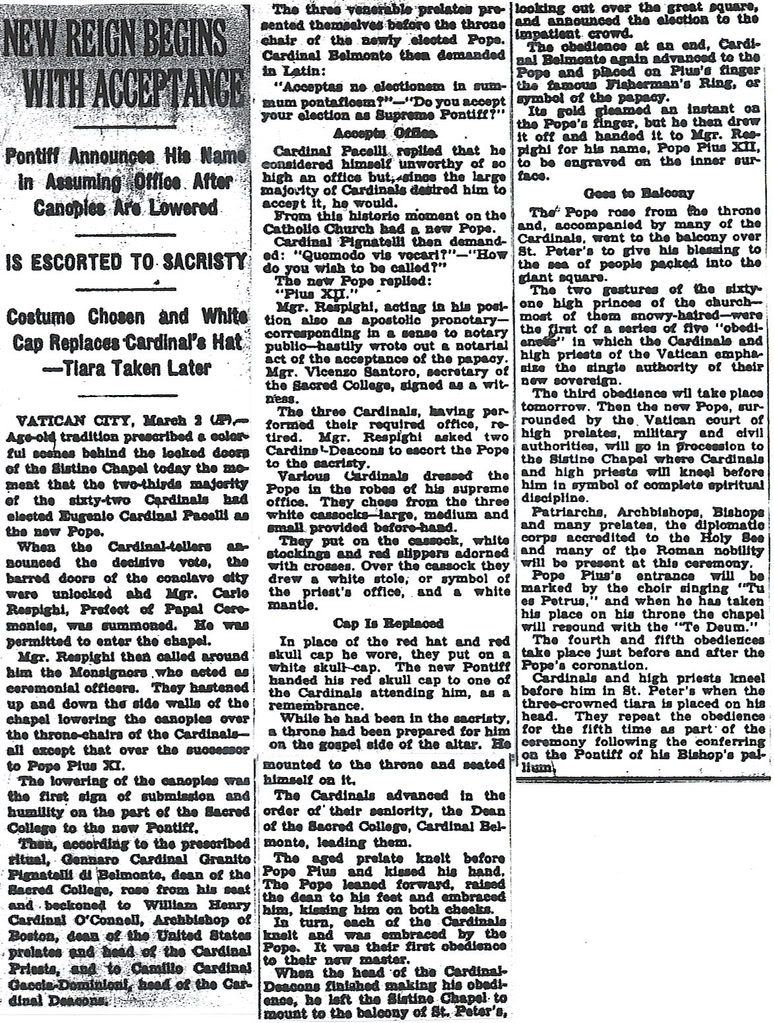
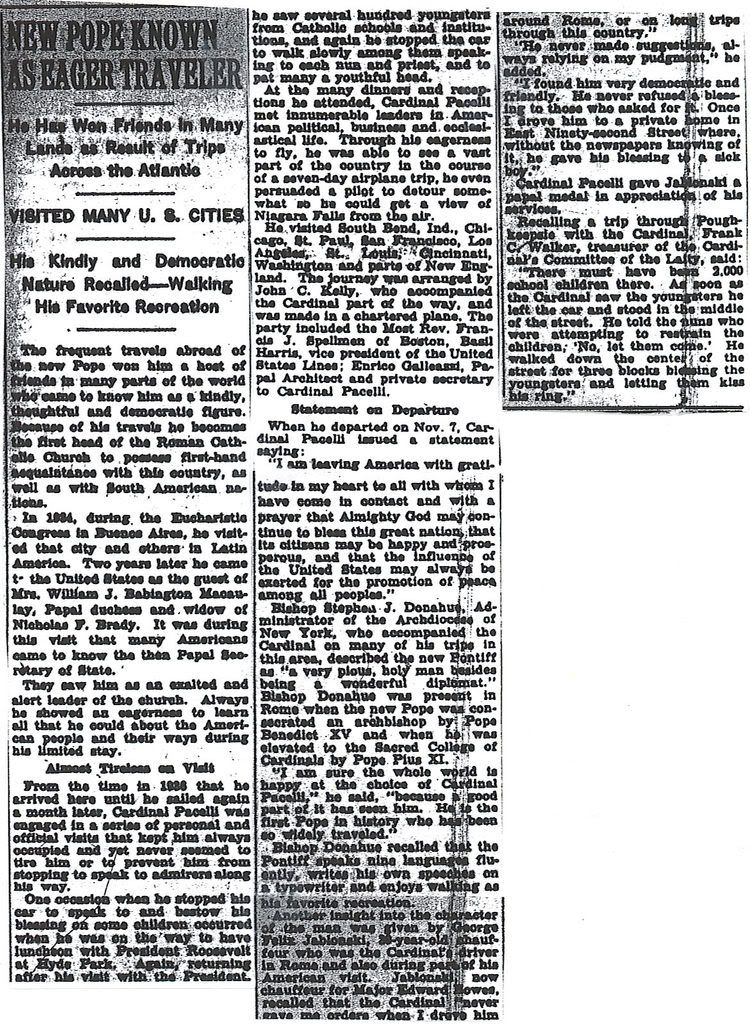
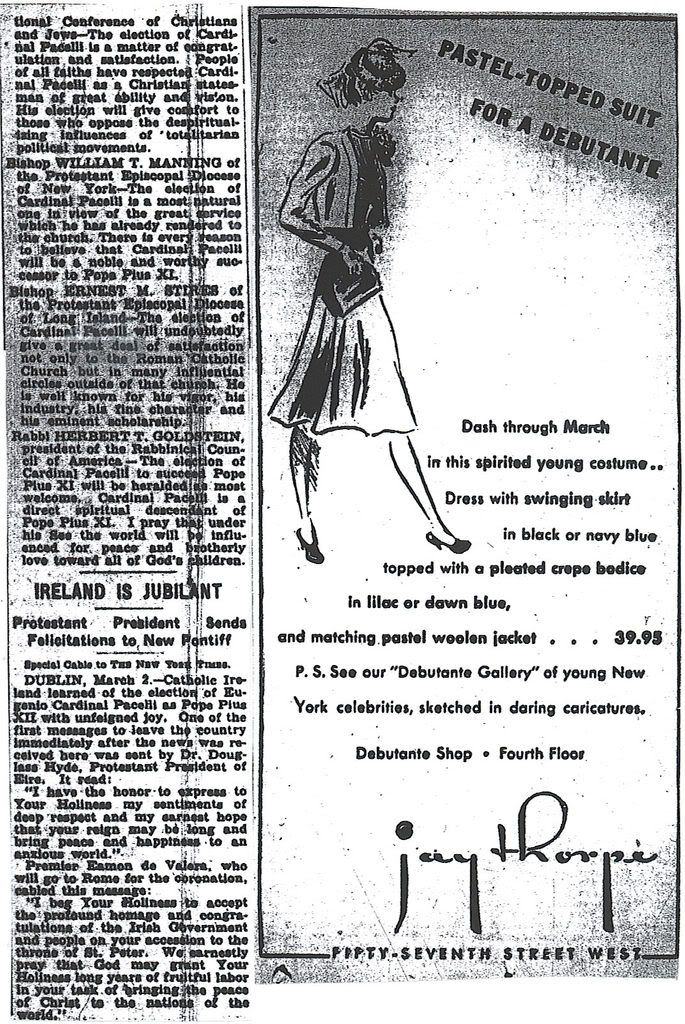
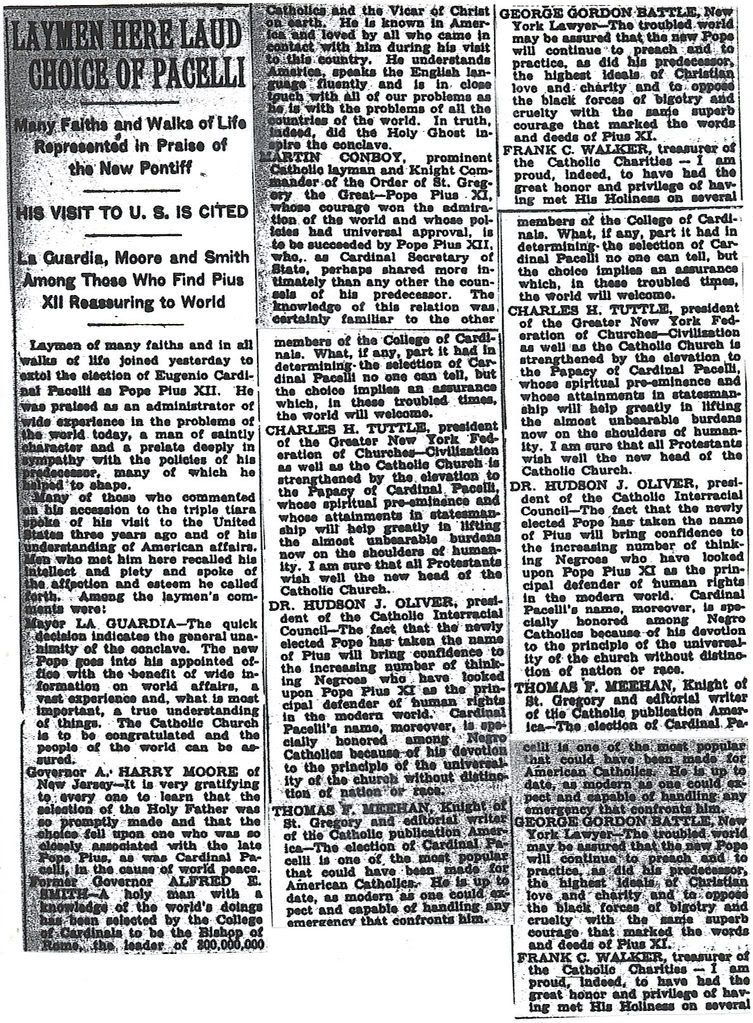
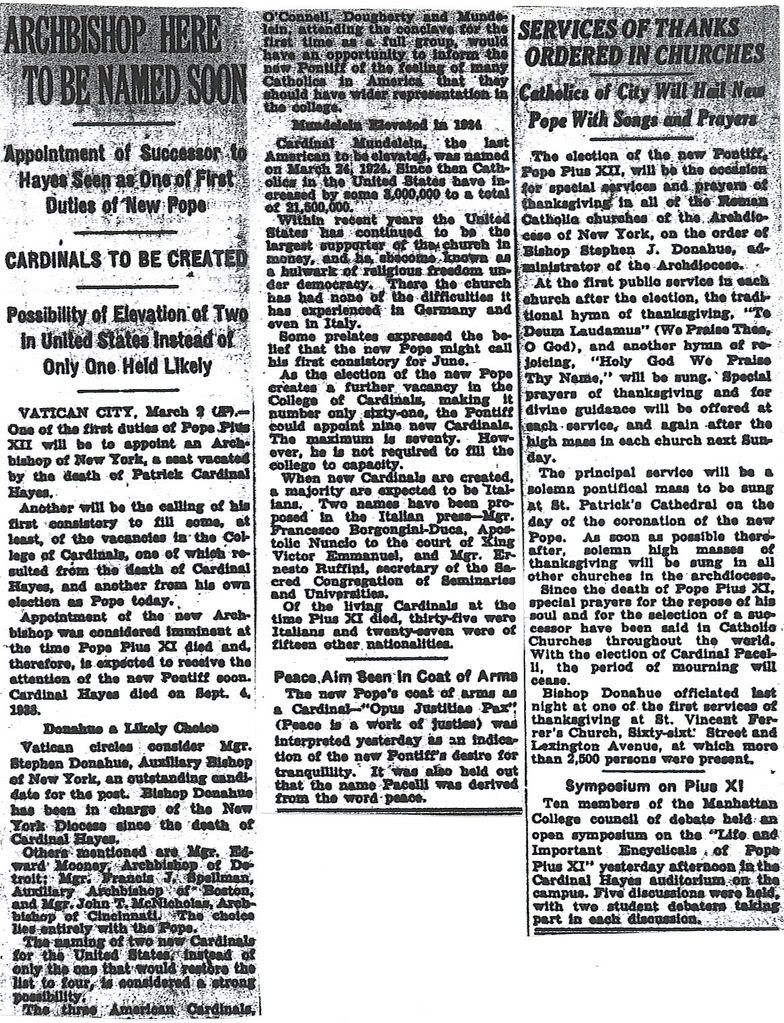
Hailed By Throngs (Lead article) 1-4
Other front page articles
Reich is Reserved over New Pontiff 5-6
New Pope Praised Fight on ‘Heresies’ 7
Conflict is Faced 8-9
Articles from middle of first section
Pius XII Won Fame as Vatican Envoy 10-14
New Reign Begins with Acceptance 15
New Pope Known as Eager Traveler 16
France Applauds Choice of Pontiff 17
London Sees Gain for Cause of Peace 18
Donahue Acclaims Naming of Pacelli 19-20
Washington Hails Pacelli Election 21
Chamberlain aids Palestine Parley 22-23 (Mostly non-Pope related)
Laymen Here Laud Choice of Pacelli 24-26
Archbishop Here to be Named Soon 27
Editorials
Pius XII 28
Britain in Palestine 29
M. COULONDRE, French Ambassador in Berlin,
to M. GEORGES BONNET, Minister for Foreign Affairs.
Berlin, February 24, 1939.
I HAVE received no answer whatsoever to the démarche which I made in accordance with your instructions of February 4.
COULONDRE.
The February 4 instructions were simply to get Hitler to guarantee the border per the Munich Conference. On March 2nd there was this exchange...
M. COULONDRE, French Ambassador in Berlin, to M. GEORGES BONNET, Minister for Foreign Affairs.
Berlin, March 2, 1939.
THE Minister for Foreign Affairs has just sent me his answer to my note of February 8, concerning the guarantee to be given to Czechoslovakia. The Department will find the translation of that document attached. The same answer, couched in identical terms, was given to the British Embassy.
As I am unable, owing to the late hour when the document reached me, to proceed to an exhaustive analysis of the document, I will confine myself to a rapid survey of the points which appear essential to me.
(1) In its comparatively veiled form, which does not however exclude certain brutal or perfidious thrusts, the German note, in substance, suggests that, in the opinion of the Government of the Reich, the conditions foreseen in annex 1 to the Munich Agreement for Germany to adhere to an international guarantee of the new frontiers of the Czechoslovak State have been in no way fulfilled up to the present time.
The annex to the Munich Agreement stipulates in fine that, after the question of the Polish and Hungarian minorities in Czechoslovakia has been settled, Germany and Italy, on their side, will also guarantee Czechoslovakia.
The German note endeavours to convey the impression that the difficulties between Poland and Hungary on the one hand, and Czechoslovakia on the other, are far from being settled. Without hesitating to contradict the official statements hitherto issued, it admits the failure of the Vienna Award. The position thus taken allows the Government of the Reich to refuse its guarantee, and consequently leaves the door open for it eventually to reconsider the entire question.
(2) The note from the German Foreign Office goes further still. It unequivocally declares that an intervention of the Western Powers in Central Europe, in the shape of a guarantee in favour of the Czechoslovak State, would do more harm than good. It would contribute to aggravate the differences of Czechoslovakia with her neighbours-other than the Reich-and perhaps even lead them to degenerate into a conflict. Doubtless the note seems in places to deal with a "premature" guarantee, but, for those who understand, it is the whole conception of a guarantee of the new Czechoslovakia by the Western Powers which it rejects. "The German Government," it points out, "cannot in any way see in an extension of this guarantee obligation to the Western Powers a factor that might allay internal quarrels in the said area, but rather an element liable to increase unreasonable tendencies, as has already been the case."
All that part of Europe henceforward is a preserve of the Reich "The German Government," the note adds, "is perfectly aware that, all things considered, the general evolution of that part of Europe falls primarily into the sphere of the Reich's most vital interests, and that not only from the historical point of view, but also from the geographical and, above all, the economic angle."
Translated into clear language, this phrase means that the Western Powers have no longer any right to interest themselves in Central European affairs.
This general theme is intermingled with perfidious allusions to the question of Palestine (for the London Government) to "more or less serious" military guarantees given by her Western friends to Czechoslovakia (for Paris), and chiefly with thinly veiled threats against the elements which, in Czechoslovakia, might continue even today to oppose German domination.
At first sight this document is therefore anything but reassuring as to the immediate intentions of Hitler's policy towards Czechoslovakia.
COULONDRE.
So not only has Germany remained completely noncommittal on Czechoslovakia but in that last highlighted paragraph it appears that they are also telling the Western Powers to Butt-Out. I said a few days ago that it looked like Hitler was posturing and this looks like more of the same. He is setting the stage for the absorption of Czech territory on the creation of the puppet Slovakia.
Here is an English translation of the German response that the French Ambassador in Berlin was commenting on.
Berlin, February 28, 1939.
IN its note verbale No. 78 of February 8, 1939, the French Embassy raised the question of a guarantee for the Czechoslovak State, a question dealt with in the annex to the Munich Agreement of September 29, 1938. Referring to the conversation which took place on this matter in Rome between the Head of the Italian Government and the British Prime Minister, the Embassy expressed the desire of its Government to know the attitude of the German Government in this matter. The Ministry of Foreign Affairs has the honour to reply to the Ambassador as follows:
In the course of the conversations which took place during the Munich conference, the German Government, in answer to the suggestions made to them, made it dear that they could not consider granting a guarantee to the Czechoslovak State, unless the other neighbours of that State showed themselves equally disposed to enter into a similar engagement. Even though the possibilities of a conflict between Czechoslovakia enjoying a guarantee and the German Reich are reduced to the minimum for the future, the same cannot be said of the differences which might arise between Czechoslovakia and her other neighbours. The participation of Great Britain and France in such an engagement to guarantee Czechoslovakia appears, in the opinion of the German Government, as an inadequate safeguard against such differences arising and multiplying and leading to conflicts. The Government of the Reich rather apprehends, on the basis of past experiences, that a declaration of a guarantee in favour of Czechoslovakia by the Western Powers might contribute to aggravate the differences of Czechoslovakia with the neighbouring States. It will not, for instance, have escaped the notice of the French Government that a divergence of view persists between Hungary and Poland on the one hand, and Czechoslovakia on the other, as to the fairness of the delimitation of their present frontiers. The Government of the Reich and the Italian Government undertook that delimitation in the hope of attaining, by an effort which they then thought to have been successful, such a compromise as would meet with the approval of all parties concerned. Since then events had shown that, in this region where national groups are so hopelessly intermingled, and where conditions of life cannot be compared with those prevailing in the West, it was really very difficult to arrive at a compromise which would be satisfactory to all. The French Government perhaps might better understand how uncertain the result of such attempts remains, even when prompted by the best intentions, if it will recall the alternative schemes of the British Government for the solution of the question of Palestine. It appears to be beyond doubt that the chief cause for the critical development of the Czechoslovak problem is to be found in the fact that, in the past, as a result of the more or less serious military guarantees which they had received from the Western Powers, the successive Czech governments thought that they could simply ignore the imprescriptible claims of the national minorities. Hence the state of internal tension which finally led to the solution arrived at in 1938.
It is not to be denied that even today the elements responsible for past developments are continuing their intrigues within Czechoslovakia, even though contrary to the wish of the present Government. An undeniable danger exists that prematurely given guarantees, far from bringing about a reasonable solution of the Czechoslovak internal problems, might rather contribute to consolidate existing opposition and thus provoke further conflicts. In the belief that it might pacify this region in which, by force of circumstances, it happens to be the most interested party, the Government of the Reich, in cooperation with the Italian Government, made the Vienna Award, which, as time has shown, met with only a qualified welcome from the interested parties. They do not therefore consider themselves in a position to provoke unnecessarily by another premature intervention criticism against measures which they have taken in countries with which they wish to live on terms of peace and friendship. Consequently, and as already indicated, they cannot consider an extension of this promise of guarantee to the Western Powers as likely to allay internal unrest in the area concerned, but rather as an element liable to encourage unreasonable tendencies, as has been the case before. The German Government are perfectly aware that, all things considered, the general evolution in that part of Europe falls primarily into the sphere of the Reich's most vital interests, and that not only from the historical point of view, but also from the geographical and, above all, from the economic, angle.
They are also of opinion that it is necessary first of all, before taking up a new position, to wait until developments within Czechoslovakia have been clarified, as well as for the improvement which cannot fail to be the result in the relations between that country and the neighbouring States.
ping, thinking you’d be interested.

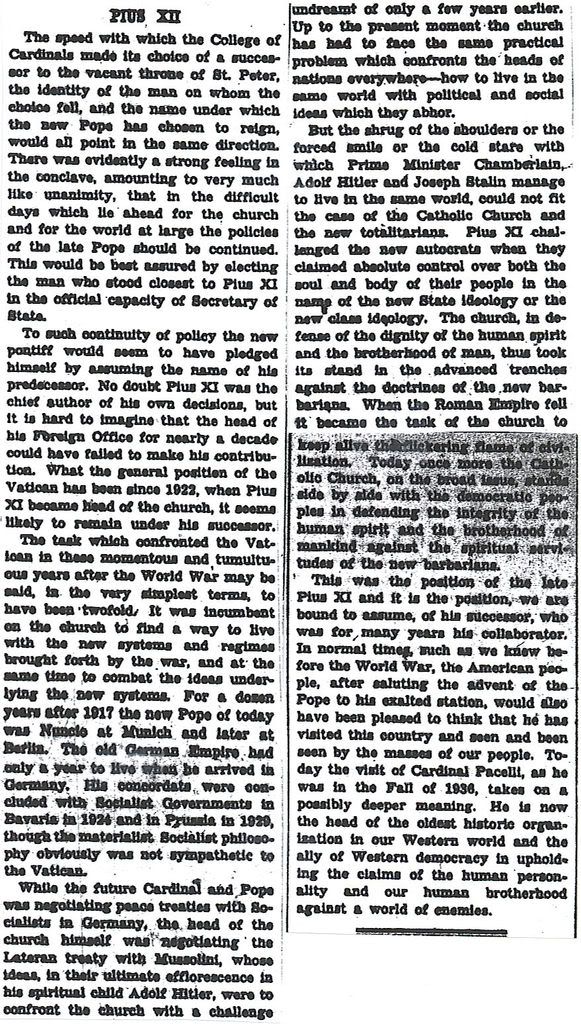
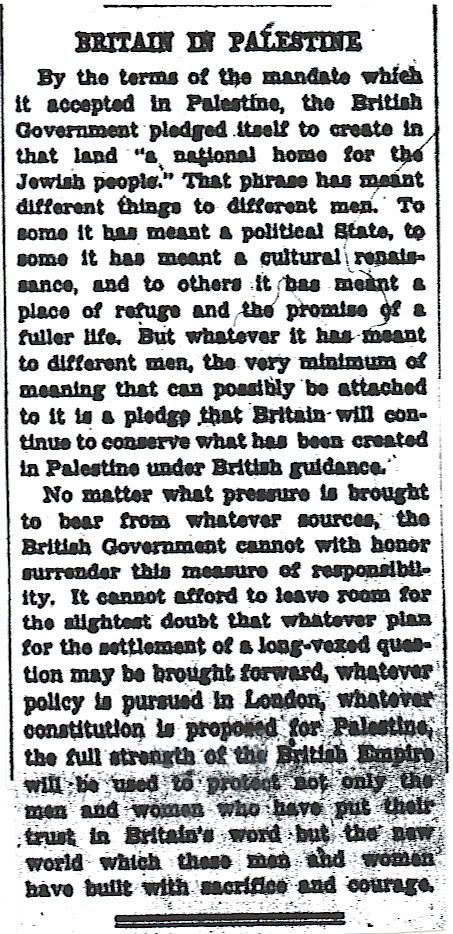
Given that I am reading Daniel Silva’s “The Confessor” this is an interesting post.
Oh! And add me to ping list, please!
Disclaimer: Opinions posted on Free Republic are those of the individual posters and do not necessarily represent the opinion of Free Republic or its management. All materials posted herein are protected by copyright law and the exemption for fair use of copyrighted works.